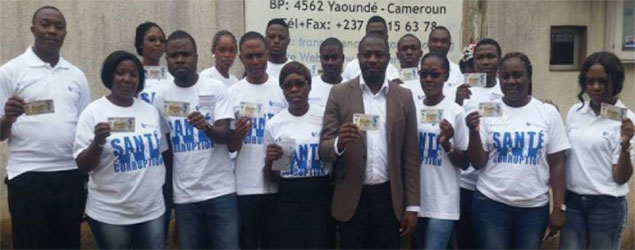
Article
November 1, 2017
Corruption No Sissia: TI Cameroon develops a successful whistleblowing platform for healthcare patients
Written by Tilly Prior & Sarah Harris-Steingrüber

Transparency International Cameroon (TI-C) has successfully implemented an online whistleblowing platform for patients to report instances of corruption in healthcare service delivery. This pilot project was supported by Indigo Trust through Transparency International’s Health Action Fund, a grant giving entity of the Pharmaceuticals and Healthcare Programme that supports the work of local TI chapters in the health sector.
In 2010, Cameroon’s National Anti-corruption Commission (CONAC) evaluated the intensity of corruption in public hospitals at 8/10, which was exceptionally high. Among the causes for the high score was a weak whistleblowing mechanism. TI-C set out to develop a collaborative online platform that would enable patients to report corrupt practices with the hope was that this would discourage corruption among health practitioners.
The following is a report on the success of this 6-month pilot project based on the results of the mid-term review. A full report of final results will be provided later this year.
TI-C carried out an in-depth survey at target hospitals and hospital zones. Following analysis of the survey results, they were able to highlight the significant drivers and manifestations of corruption in the health sector of Cameroon. They also brought five stakeholder groups on board to support the whistleblowing platform, including the Ministry of Health and the Regional Delegation of Public Health for the Centre Region of Cameroon.
The whistleblowing platform was intended for the reporting of corruption, particularly bribes or overcharging for health goods and services. In their early research, TI-C discovered that since 1987, there has been no updated policy on the cost of publicly provided health services. Cost of drugs and other goods, however, is regulated by the country’s list of essential medicines. TI-C is committed to advocating for an updated policy in a second project phase.
TI-C successfully established Corruption No Sissia, a whistle-blowing platform for patients to report corruption in healthcare. The service is designed to accommodate literate and illiterate populations and patients can log complaints online, by SMS or by calling a local number. The complaints are received by TI-C, and hospital administrators of the target hospitals are given a means to view complaints concerning their hospitals. The administrators then undertake measures to address the situation at the facility level. Complaints received are assessed by TI-C and shared directly to the Ministry of Health and other pertinent stakeholders to be dealt with. Through the hard work of TI-C and outreach volunteers who did awareness raising of local populations on the importance of reporting corruption, they were able to alert and communicate with 3000 providers and patients. This exceeded the original target of 1000 providers and patients. The volunteers communicated the importance of reducing corruption in healthcare service delivery and how to use the Corruption No Sissia platform as a tool to report instances of corruption. Just two weeks after the sensitisation campaign was completed, the platform had registered 450 page users and had 20 reports directly through SMS and online submission.
In the face of some entrenched pessimism and resignation from the citizenry, who often suggested that nothing could be done to better the corruption situation in healthcare service delivery, the volunteers and TI-C were able to convince them to get involved. The results up to this point reflect the rewards of all their hard work; since the launch of the whistleblowing platform, 600 victims and witnesses of corruption have subscribed to Corruption No Sissia and there have been 200 reports of corruption registered. This is a phenomenal success. The word is being spread and, thanks to the energy and endeavour of TI-C, the hope is that more patients will subscribe and reports will continue to be registered before the final results of the project are in.
Stay tuned for further updates!
About Sarah Harris-Steingrüber
Sarah joined the Pharmaceuticals & Healthcare Programme in January 2017 and has a strong background in the area of public health and international development and has worked with UN and national development agencies in Europe, Southeast Asia and West Africa.
About Tilly Prior
Tilly joined the Pharmaceuticals & Healthcare Programme in October 2017 as an intern. She is a graduate of University of Sussex with a Master’s degree in Corruption and Governance.